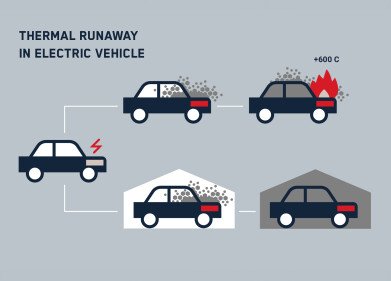Health & Safety
Where Is Mercury Found? - Air
Apr 02 2022
When most of us hear the word mercury, we instantly think of the silver liquid in old-fashioned thermometers or the solid amalgam used in dental fillings. Indeed, a significant proportion of people are likely unaware that mercury can even take gaseous form, but atmospheric mercury is all around us. A naturally occurring element, it’s largely harmless in small concentrations – but can be deadly to humans, animals and plant life at higher levels.
Although mercury is emitted into our atmosphere through a variety of natural means, atmospheric levels of the substance have more than tripled in both the northern and southern hemispheres over the last two centuries. That’s come about as a direct result of the Industrial Revolution and the massive increase in anthropogenic activity that it has engendered, sparking fears about the toxicity of mercury, the poisoning it causes and the testing which must be done to maintain safety and sustainability.
How does mercury arrive in the air?
As a naturally occurring element in our environment, mercury can find its way into the atmosphere through several organic sources, such as forest fires and volcanoes. However, around half of the airborne mercury particles in our environment today have been emitted from manmade sources, causing a serious imbalance to the delicate harmony of our ecosystems.
Mining is one of the biggest sources of mercury emissions, with gold and other precious metals particularly polluting. The combustion of fuel sources is another chief culprit, with coal containing especially high amounts of the metallic element. Oil, gas, wood and biomass also contribute to mercury emissions from energy generation. Other manmade sources of atmospheric mercury include waste incineration, non-ferrous metals production, cement production and oil refining.
What are the consequences of atmospheric mercury exposure?
The most common methods of human exposure to atmospheric mercury occur in workplaces where the element is present or processed, such as power stations, smelting furnaces, waste incinerators and other industrial facilities. However, mercury can also take a gaseous form if apparatus containing its liquid form is broken or spilled and it evaporates into the air.
The health ramifications of exposure to atmospheric mercury vary depending on the type of mercury in question. For example, elemental mercury is not dangerous to humans if ingested or absorbed via dermatological contact, but can severely damage the lungs and brain if inhaled. Inorganic mercury can attack the kidneys, central nervous system (CNS) and brain, impairing cognitive functioning and compromising renal activities. In extreme cases, it can be deadly. Little is known about the after effects of long-term, low-level exposure to airborne mercury.
How do we monitor for mercury in the air?
There are a variety of different ways for testing the airways for mercury concentrations, with the collection of particulates samples (using air filters) and vapours (via sorbent tubes) two of the most common. Monitoring for mercury in the air has become a global requirement in recent years, with certain industrial sites required to implement adequate monitoring equipment and report their findings to the relevant authorities.
For more information on the regulations surrounding mercury monitoring and the methods used to achieve compliance, interested parties are invited to attend the International Conference on Mercury as a Global Pollutant (ICMGP). Open to all comers, the event will take place virtually from the 24th to the 29th July 2022.
Digital Edition
AET 28.2 April/May 2024
May 2024
Business News - Teledyne Marine expands with the acquisition of Valeport - Signal partners with gas analysis experts in Korea Air Monitoring - Continuous Fine Particulate Emission Monitor...
View all digital editions
Events
Jul 30 2024 Jakarta, Indonesia
China Energy Summit & Exhibition
Jul 31 2024 Beijing, China
2024 Beijing International Coal & Mining Exhibition
Aug 07 2024 Beijing, China
IWA World Water Congress & Exhibition
Aug 11 2024 Toronto, Canada
Aug 25 2024 Stockholm, Sweden and online









.jpg)








